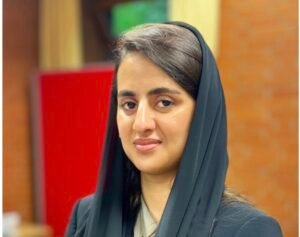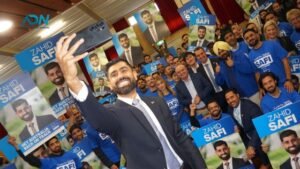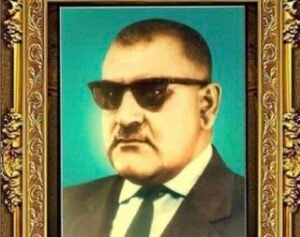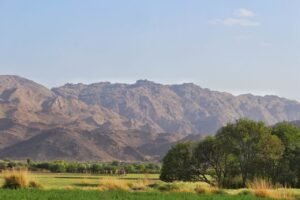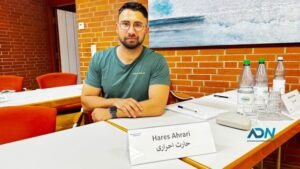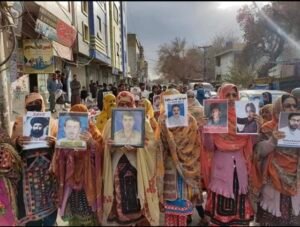In Search of Identity: Finding Home Between Germany and Afghanistan
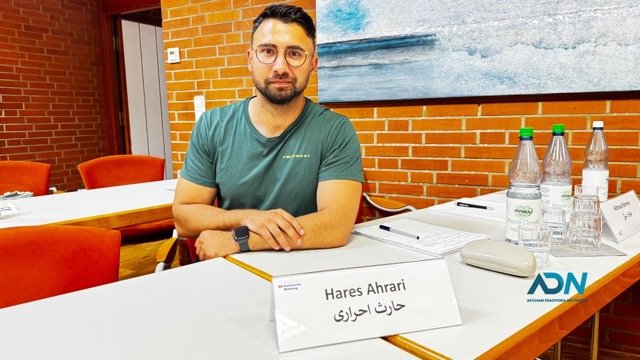
Hares Ahrari speaking with ADN during Afghanistan-Hamburg Week 2025. Photo: © Ali Ahmad for ADN
ADN
Seevetal, Germany — For Hares Ahrari, identity is not a straightforward question. Born to an Afghan father and a Ukrainian mother, and raised in Germany for more than 30 years, he navigates multiple cultures daily. By profession, he is an architect. By heart, he is a seeker — of belonging, of language, of heritage.
“I’ve always felt something was missing,” says Ahrari. “I know Afghanistan only through what my family told me, or what I see on social media. But that isn’t enough. I want to experience it myself — the culture, the people, the history — especially from my father’s side.”
That curiosity recently led him to Afghanistan-Hamburg Week, an annual event held in Seevetal near Hamburg, organized by the Afghanistan Information Center (Afghanic e.V.), a diaspora-led organization in Germany, in cooperation with the Verein für politische Bildung.
This year marked the 30th anniversary of the event, where members of the Afghan diaspora and Germans come together for a week-long exchange on Afghan society, politics, and urban development. The gathering brings together academics, aid workers, and community members to explore Afghanistan’s past, present, and future.
For Ahrari, it was a window into a world he longs to understand more deeply — and an important step in bridging the gap between heritage and lived experience.
Ahrari was particularly captivated by a presentation on Kabul’s urban planning, delivered by another fellow architect.
As an architect, he found inspiration in how cities evolve, even under political and social strain. “It was powerful to see how the built environment reflects the struggles and hopes of a nation,” he said.
Yet beyond blueprints and masterplans, Ahrari is on a more personal mission — to reconnect with Afghan culture in ways that daily life in Germany rarely allows. Living in a small town in North Rhine-Westphalia, far from Afghan communities concentrated in cities like Hamburg or Frankfurt, Ahrari says cultural touchpoints are limited.
“There are no Afghan restaurants in my city, no community centers. It’s very different,” he explains. “I rely on my mother’s cooking to bring Afghan flavors into our home. And I listen to Afghan music, which makes me happy. But I’m missing that deeper cultural connection.”
One of the biggest barriers is language. While Ahrari can understand some Dari, he admits he cannot yet speak it fluently. “I’m learning,” he says. “I use social media, I translate texts, I watch videos — but it takes time. Still, it’s important. Language carries the soul of a culture.”
Language also plays a key role in integration — a topic Ahrari feels strongly about. With the influx of Afghan refugees into Germany since 2015, the diaspora has grown rapidly. Many have built lives in major German cities, opening businesses and contributing to the local economy. But challenges remain.
“Learning German is essential for integration,” Ahrari emphasizes. “I’ve met people who’ve been here for seven years and still struggle with the language. That limits everything — from job opportunities to social connection. But I’ve also met Afghans who’ve been here for just a year or two and already speak fluent German. It’s about willpower.”
Integration, however, is not a one-way street, he says. “It’s not just up to Afghans to adapt. German society must also support them, guide them, show them what the culture and laws are. Without that mutual effort, true integration isn’t possible.”
Ahrari has found that many Germans are genuinely curious about Afghan culture — especially when it’s presented through personal stories rather than media headlines.
“The media often paints Afghanistan in a negative light — war, instability, crisis. But that’s not the full picture,” he says. “When I talk to Germans about Afghan food, music, and hospitality, they’re surprised. They’re interested. And that makes me proud.”
Still, the shadow of conflict lingers. “People ask me about Afghanistan because of what they hear in the news — mostly bad news,” he says. “But I try to show them that Afghan people are kind, open-minded, and resilient. We are more than what the media shows.”
Ahrari maintains contact with relatives in Afghanistan and supports them alongside other family members in Germany. “It’s a responsibility we feel, even from afar,” he says.
Despite having never set foot in the country, Ahrari speaks of Afghanistan with a deep emotional connection. “It’s not just a place on a map. It’s in my blood. It’s part of my identity,” he says.
He hopes one day to travel there — but carefully. “Before I go, I want to learn more. I need to understand the laws, the safety situation. I want to do it right,” he says.
Seminars like the one he attended are helping him prepare for that journey. They also offer something else: a space where Afghans and Germans come together to share knowledge, break down stereotypes, and build mutual understanding.
“This dialogue is crucial,” Ahrari insists. “It’s how we build bridges — not just between people, but between cultures.”
His message is clear: communication is the key to both integration and identity. “In a democratic society, dialogue is everything,” he says. “Whether you’re Afghan, German, or both, we need to talk. We need to listen. Only then can we move forward — together.”
For Hares Ahrari, the journey to Afghanistan may still lie ahead. But the journey into himself — into language, memory, and belonging — has already begun.

